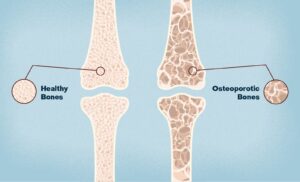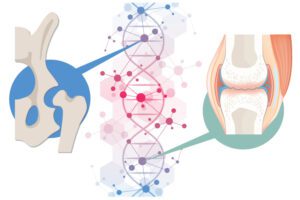Introduction to Genetics and Orthopedic Treatment

Have you ever wondered why some people are more prone to fractures, or why osteoarthritis strikes seemingly out of nowhere? The answers may lie in our genes. Orthopedic health, the pillar of our ability to move, rest, and live without pain, is heavily influenced by genetics. This invisible yet powerful force shapes not only our risk for certain conditions but also how we respond to treatments.
In this blog, we’ll explore the fascinating role genetics plays in orthopedic conditions and treatment responses. From common ailments like osteoporosis to the burgeoning field of personalized orthopedics, this exploration will help patients, researchers, and medical professionals appreciate the genetic intricacies that underpin bone and joint health. Read on to uncover how advances in genetic testing are revolutionizing the landscape of orthopedic care.
Common Orthopedic Conditions with Genetic Components
Orthopedic conditions affect millions worldwide, and many are influenced by genetic factors. Recognizing these components is vital for better diagnosis, prevention, and treatment.
Osteoporosis

Osteoporosis is a condition characterized by weakened bones, making them prone to fractures. While lifestyle factors like diet and exercise play significant roles, genetics can dictate up to 80% of an individual’s bone density. Understanding one’s genetic predisposition can pave the way for early interventions and tailored lifestyle changes to mitigate risks.
Osteoarthritis
Osteoarthritis, a degenerative joint disease, is another condition with genetic ties. Studies have shown that variations in genes related to cartilage production and maintenance may increase susceptibility. Knowledge of these genetic factors can guide patients and doctors in developing more effective management plans.
Scoliosis
Scoliosis, the abnormal curvature of the spine, can also be traced back to genetic roots. Specific genetic markers have been linked to the likelihood and severity of scoliosis, aiding in early detection and more personalized treatment approaches.
Genetic Factors Affecting Treatment Response
Genetics doesn’t just influence the onset of orthopedic conditions; it also plays a crucial role in how patients respond to treatments. Understanding these factors can lead to more successful outcomes and fewer complications.
Surgery and Recovery
Genetic variations can affect how the body heals from surgery. For instance, some genes influence collagen production, essential for tissue repair. Knowing a patient’s genetic makeup can allow surgeons to tailor post-operative care, potentially speeding recovery times and improving results.
Medication Efficacy
Medications used to treat orthopedic conditions, such as pain relievers and anti-inflammatories, can have varying effects based on genetic differences. Pharmacogenomics, the study of how genes affect a person’s response to drugs, is paving the way for more personalized prescriptions, minimizing side effects and maximizing effectiveness.
Physical Therapy
Even responses to physical therapy can be genetically influenced. Some patients may have genetic traits that enable more rapid muscle recovery and growth, allowing for faster rehabilitation. Recognizing these traits can help therapists design more targeted and efficient exercise regimens.
The Future of Personalized Orthopedics
The field of personalized orthopedics is rapidly evolving, driven by advancements in genetics and technology. This personalized approach aims to tailor treatment plans based on an individual’s genetic profile, promising more precise and effective care.
Genetic Testing
Genetic testing has become more accessible and affordable, allowing for early identification of risk factors for orthopedic conditions. This proactive approach empowers patients to make informed lifestyle decisions and seek preventative care before issues arise.
Personalized Medicine
Personalized medicine, driven by genetic insights, is revolutionizing how orthopedic conditions are treated. Customized treatment plans can be developed to suit individual genetic profiles, maximizing efficacy and minimizing adverse reactions. This approach fosters a more patient-centered and successful healthcare experience.
Future Innovations
The future holds exciting possibilities for personalized orthopedics. Researchers are exploring gene therapy and regenerative medicine as potential treatments for orthopedic conditions. These cutting-edge therapies could offer new hope for patients with genetic predispositions to bone and joint disorders.
Case Studies and Research
Real-world examples and research findings illuminate the profound impact of genetics on orthopedic health. Let’s explore some notable studies and their implications.
Genetic Research in Osteoporosis
Recent studies have identified multiple genes associated with bone density and fracture risk. These findings are guiding the development of genetic screening tools to predict osteoporosis risk and tailor preventative measures. By understanding genetic predispositions, individuals can take proactive steps to safeguard their bone health.
Breakthroughs in Osteoarthritis Treatment
Research into the genetic basis of osteoarthritis has led to promising new treatment options. Gene therapy techniques are being explored to target specific genetic pathways involved in cartilage degeneration, offering hope for patients with genetic susceptibility.
Scoliosis and Genetic Markers
In scoliosis research, genetic markers have been identified that can predict the likelihood and progression of the condition. This breakthrough is revolutionizing early detection and allowing for more targeted interventions, potentially reducing the need for invasive treatments.
Practical Implications for Patients and Healthcare Providers
Understanding the role of genetics in orthopedic health has practical implications for both patients and healthcare providers. By harnessing genetic insights, we can improve patient outcomes and enhance the quality of care.
Empowering Patients
For patients, knowledge of genetic predispositions allows for informed decision-making. By understanding their genetic risk factors, individuals can take proactive steps such as lifestyle modifications, early screenings, and personalized treatment plans to manage orthopedic conditions effectively.
Tailoring Treatment Plans
Healthcare providers can leverage genetic information to tailor treatment plans to each patient’s unique needs. This personalized approach enhances treatment efficacy, reduces side effects, and improves overall patient satisfaction. By incorporating genetic insights into clinical practice, providers can deliver more precise and effective care.
Collaborative Care
Collaborative care between genetic researchers, orthopedic specialists, and healthcare providers is essential in advancing personalized orthopedics. By fostering interdisciplinary collaboration, we can accelerate the translation of genetic research into clinical practice, benefiting patients and advancing the field of orthopedic care.
Understanding the role of genetics in orthopedic conditions is a vital step in advancing healthcare. By recognizing the genetic factors contributing to bone and joint health, we can empower patients to make informed decisions and tailor treatment plans to individual needs. The future of orthopedics lies in personalized care, where genetic insights guide prevention, diagnosis, and treatment.
To stay updated on the latest advancements in genetic orthopedics and personalized care, consider exploring additional resources and engaging with healthcare professionals who specialize in this field. By staying informed and proactive, we can unlock the potential of genetics to transform orthopedic health and improve the quality of life for individuals worldwide.

